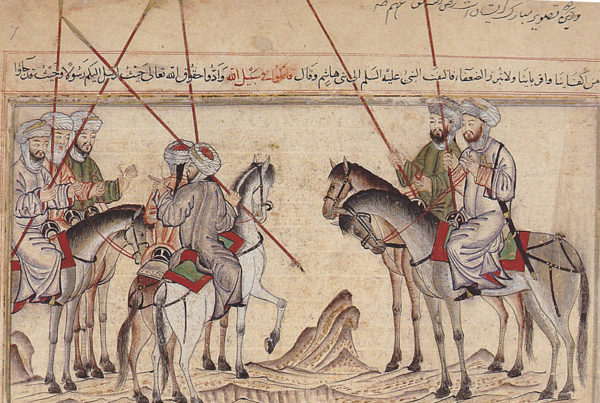As the furor over a dozen Danish cartoons kindles righteous anger in the Muslim world, Westerner bloggers compose satirical ditties. It’s scary. But not for us.
If you haven’t read Victor Davis Hanson’s Carnage and Culture: Landmark Battles in the Rise of Western Power (NY: Anchor Books, 2002), now is a good time — especially as the international situation heads in a discouraging direction for the umpteenth time since 480 BC, because the West is exhibiting the same hidden strength it consistently has in the last 2500 years. As Hanson explains, it’s hidden in the same place too: not behind lies about peaceful nuclear energy or a vast rusty iron curtain, but in plain view. Our strength is our freedom, which our enemies mistake for weakness until after it’s too late. Long after. The persuasive way he advances this thesis makes Carnage and Culture one of the very few public policy books I’ve ever found both persuasive and encouraging.
He begins with the mighty Persian tyrant Xerxes invading Greece. Right up to the crucial battle of Salamis in 480 B.C. “free Greeks continued to bicker, vote, and threaten each other, all the while unfree Persians annexed even more of their native soil. This freedom to explore different strategies, debate tactics, and listen to complaints of the sailors was raucous and not pretty, but when the battle itself got under way, the Greeks, not the Persians, had at last discovered the best way to fight in the strait of Salamis.” The Athenians might have looked like a bunch of drunken longhairs questioning the gods, their elders and their government. But as Hanson notes in another book, The Wars of the Ancient Greeks, “Nearly every major Greek author, philosopher or statesman” including Socrates, Thucydides and Xenophon “at some time wore a breastplate and killed another human – something historians and literary critics should always keep in mind when they assess the character and ideology of Greek politics, art, philosophy and literature.”
Their enemies could usefully have kept it in mind too. It might have helped them understand the lethal Western combination of freedom with order. Instead they don’t even recognize it. Which is why, despite dozens of such battles from Salamis to Lepanto and Midway, it remains unsurprising that the victors of the first Gulf War revolutionized their battle tactics in the following 12 years while the loser did not.
In the “war on terror”, media reports of relentless attacks by countless terrorist “masterminds” notwithstanding, it is the initially unprepared democracies who are improvising successfully. There was no follow up to 9/11. And while nation-building in Iraq may be impossible, Hanson’s topic is military prowess not social engineering. So is it not noteworthy that the newspapers have lately reported far fewer American deaths there? A reasonable observer might attribute terrorist atrocities against children and mosques to desperation not invincible genius. Hanson also says regarding Vietnam that the sheer unreasonableness of the antiwar movement tarnished the notion of democratic dissent, something thoughtful leftists might consider regarding Iraq.
I don’t recommend complacency about the glaring weaknesses the West also exhibits. Useful idiots — official and private alike –exert far too much influence on high diplomacy and on the everyday operations of the justice and immigration systems. But it is encouraging to recognize how even these weaknesses contribute to a vitality that is far more resilient than it seems in the face of tyrannies that are far more brittle than they seem.
Consider U.S. Defense Secretary Donald Rumsfeld openly telling the Council on Foreign Relations “Our enemies have skilfully adapted to fighting wars in today’s media age, but… our country has not,” so the American government risked a “dangerous deficiency” in the global public relations struggle. Xerxes would find such an admission pitifully weak. But self-criticism is actually a great asset, whereas pride and complacency are dangerous weaknesses. Of course this struggle over public opinion is by no means exclusively a government responsibility; American dynamism like the Athenian kind comes mostly from citizens not the state — including bloggers and journalists hammering away at the cartoon issue from every imaginable angle.
Some of the on-line parodies of radical Islam are tasteless and others just unfunny. But a tireless exploration of what gets a laugh about their actions or arguments exposes weaknesses we can exploit, while finding what gets a laugh about our own exposes weaknesses we should fix. Jihadis who don’t find anything funny accomplish neither.
While they’re out there burning down embassies they’re getting weaker, and while we’re in our rooms doing java animations we’re getting stronger. They won’t figure out why even after it’s too late. Read Victor Davis Hanson and you will.








